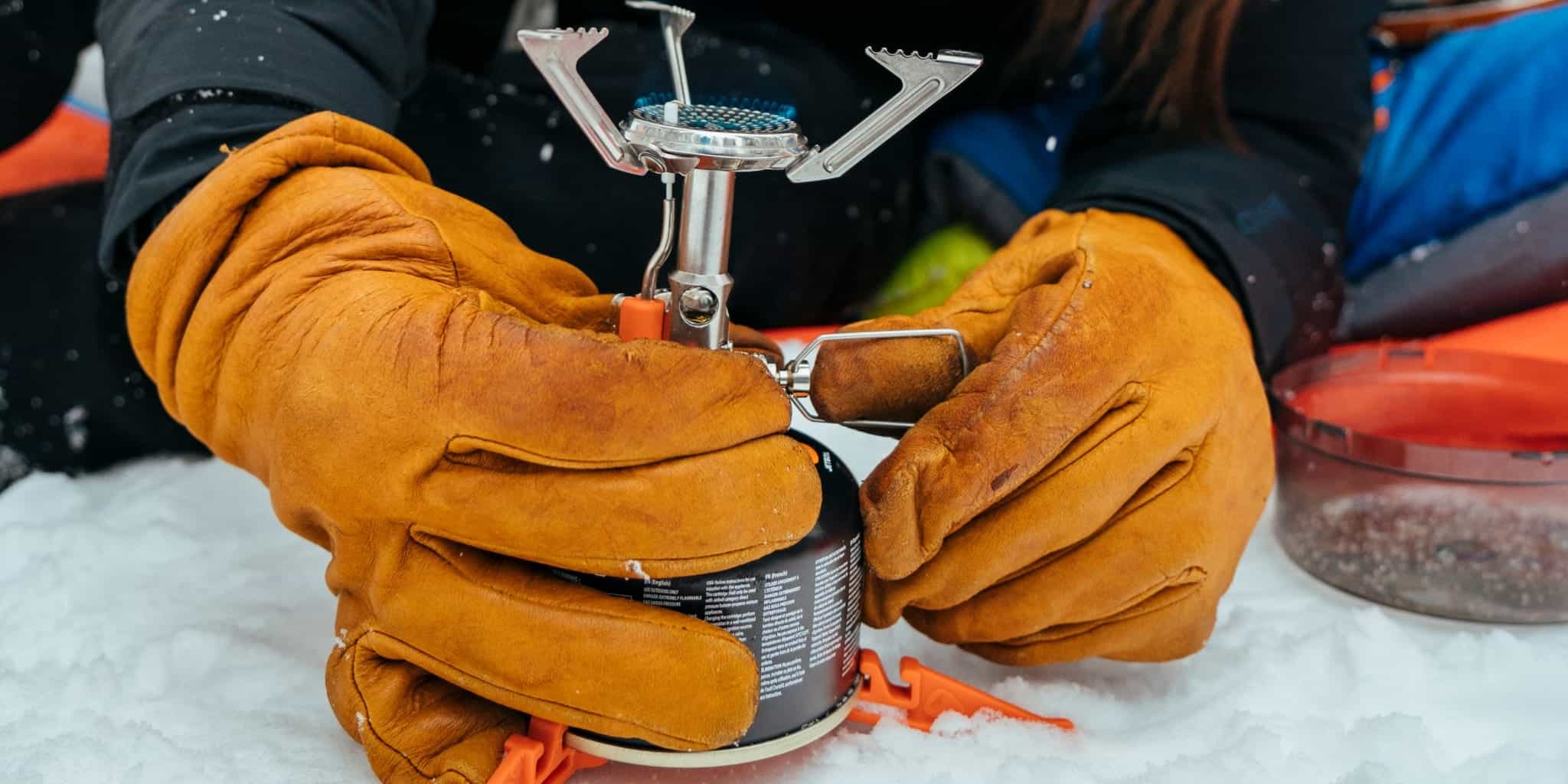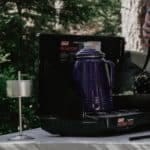If you’re wondering what fuel does Jetboil use or pondered the potential alternatives to Jetboil’s own Jetpower fuel, you’ve come to the right place.
In this article, I’m unravelling the science behind Jetboil’s fuel choice, debunking the myths, and revealing wallet-friendly alternatives. Buckle up as we dive deep into the world of camping stove fuels. Let’s get started!
Related: If you’re looking for a new stove, check out our review of the best Jetboil stove.
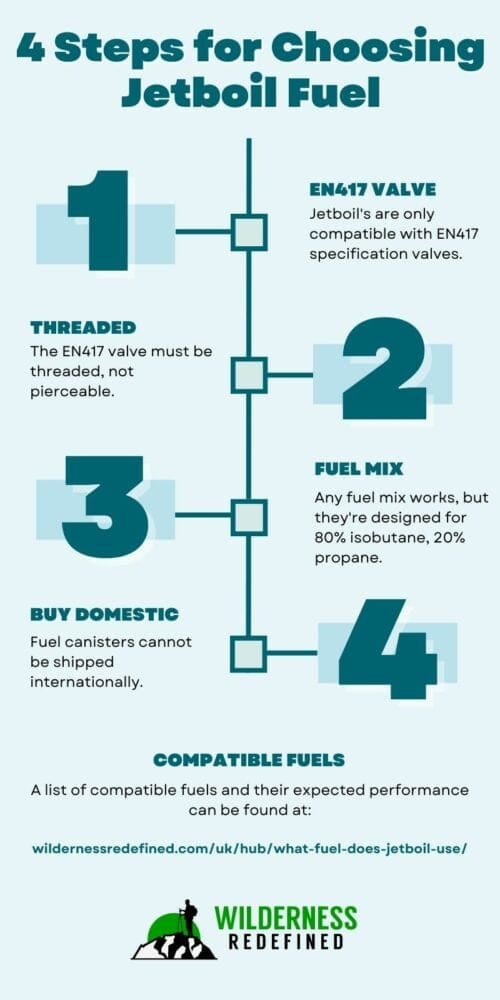
I recommend using Jetboil Jetpower Fuel with your Jetboil. You can find this following the links in the table below.
| Store | Link |
| Amazon | Check latest price |
| REI | Check latest price |
What fuel can I use with a Jetboil?
Jetboil fuel consists of an 80% Iso-Butane, 20% Propane mixture, making it suitable for use in all seasons and able to perform in temperatures as low as -44°F. Compatible fuel canisters must also have a Lindal valve.
Jetboil is designed to use Jetpower fuel canisters, a blend of propane and isobutane. These canisters are optimised for performance and efficiency in Jetboil systems and are the recommended fuel source for best results.
However, Jetboil isn’t the only brand offering this fuel mixture, and the Lindal valve is a standard international specification (EN417). I’ve listed some alternative brands of fuel that fit a Jetboil below.
Reasons behind Jetboil’s fuel choice
In the camping world, fuel canisters for your stove usually rely on an LPG (Liquefied Petroleum Gas) mix. This is often a hearty blend of propane and either isobutane or butane.
Jetboil’s Jetpower fuel has an edge in colder climates with a 20% propane mix. Propane brings a high vapour pressure to the table, meaning it can reach its boiling point at a rather frosty -42°C (-43.6 Fahrenheit). This does come with a bit of a snag, though – it needs a sturdier, bulkier canister to handle the increased pressure.
The type of gas a company chooses is a good indicator of whether it’s aiming for a budget or premium market. Butane might be kinder to your wallet, but it doesn’t exactly shine when it comes to performance. In comparison, isobutane may be pricier, but it’s a clear winner regarding functionality.
With that in mind, Jetboil has clearly gone for gold – 80% of Jetpower fuel is made up of the superior isobutane gas, which has a boiling point of -12°C (-11 Fahrenheit) as opposed to butane’s -1°C (30 Fahrenheit).
If you’re scratching your head at how a mix of isobutane and propane manages in chilly conditions when they have such different boiling points, I’ll cover this later on.
Now, onto Jetboil’s claims: they argue that combining their stoves and Jetpower fuel is a notch above your run-of-the-mill camping stove.
Apparently, using a 100g Jetpower fuel canister with a Jetboil stove boils as much water as other stoves would with a huge 227g fuel canister. Now that’s a claim that’ll prick up the ears of any hikers keen to keep their gear light and easy to lug about.
However, these efficiency gains are more likely due to the mix of fuel used or the poor performance of other stoves. If you’re already a Jetboil user, I wouldn’t expect a sudden boost in performance by switching from the near-identical MSR IsoPro to Jetpower fuel.
That said, I’m open to surprises! If enough folk are interested, I might consider running a test to see whether Jetpower stands out from the crowd – drop me a line in the comments if that’s something you’d like to see!
In a nutshell, Jetboil’s Jetpower fuel brings a high-performing fuel blend to the table. I’ve laid out some alternative brands of fuel that are compatible with a Jetboil stove further down this article.
Recommended fuel for Jetboil stoves
Jetboil state that their product performs best with their Jetpower brand fuel canisters. They also say that since they have not tested their products with other fuel canisters, they cannot claim the other canisters are safe to use with Jetboil stoves.
Remember that if Jetboil said anything else, they could be held legally responsible for any issues. But do other brand fuels work with Jetboil? Yes!
Jetboil hints that Brunton, Gigapower, Primus, MSR, and Snow Peak have the same fuel blend and valve types. However, most of these are US brands, so I’ve listed several UK alternative fuels that match the Jetboil specifications below.
Where to buy Jetboil Jetpower fuel in the UK
Many local outdoor shops stock Jetboil Jetpower fuel, but the cheapest source is often online. Jetpower fuel cannot be delivered internationally, so buy from UK retailers.
In order of the cheapest to most expensive sources I found at the time of writing, here are some places you can pick up 230 g Jetpower fuel canisters. Remember that you can also pick up 100 g canisters for shorter trips.
230g Jetboil Jetpower Canisters
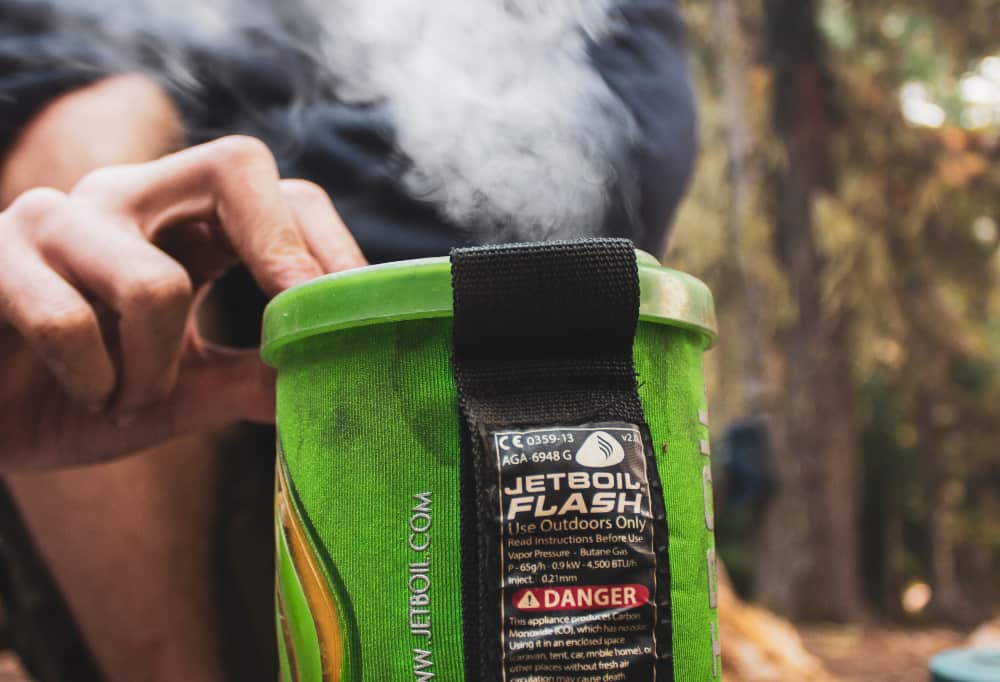
Alternative fuels compatible with Jetboil stoves
The critical requirement for compatibility with Jetboil stoves is that the fuel uses a screw thread Lindal valve. I recommend picking fuel canisters with 80% isobutane and 20% propane.
Lindal valves are often treated as synonymous with EN417 specification valves, but this isn’t quite right. Some EN417 fuel canisters have a threaded Lindal valve, while others are piercable caps only. Threaded valves mean the fuel can be removed, and the valve should reseal. Other, often cheaper, EN417 canisters can include a piercable cap instead and cannot be released until they are empty.
Jetboil’s fuel compatibility is unclear from their website, so I reached out and spoke to them. Jetboil stoves are only compatible with threaded Lindal valves, not the piercable EN417 canisters.
This means some EN417 canisters, such as the Campingaz C206 fuel, are incompatible with Jetboil stoves.
All of the alternative fuels below follow the European EN417 specification.
| Fuel Brand | Fuel Type | Removable | Jetboil Compatibility |
| Jetboil Jetpower | 80% isobutane / 20% propane | Yes | ⚡⚡⚡ |
| MSR IsoPro | 80% isobutane / 20% propane | Yes | ⚡⚡⚡ |
| Coleman Performance | 70% butane / 30% propane | Yes | ⚡ |
| Coleman Xtreme | 70% butane / 30% propane | Yes | ⚡ |
| Campingaz Plus | 80% butane / 20% propane | Yes | ⚡ |
| GoSystem Powersource | n/a | Yes | ⚡ |
Found another brand? Let me know in the comments, and I’ll add it in!
Guidelines for recycling Jetboil Jetpower fuel canisters
Jetpower fuel can be recycled at your local recycling centre. However, you must ensure the canisters are completely empty before recycling them.
Here are seven steps for recycling your Jetpower fuel canisters:
- Use the canister until no flame is produced from the camping stove. Only move to the next step for safety once no flame is produced.
- Start threading the Jetboil CrunchIt onto the canister until you hear it release any remaining gas.
- Monitor how long the gas is being released. If it takes longer than a few seconds, remove the CrunchIt tool and start back at step 1.
- Once the gas has been completely released, thread the Jetboil Crunchit as much as possible.
- Push down on the CrunchIt to puncture the canister.
- Mark the canister as empty by puncturing three more holes in the top of the canister.
- Find the nearest local recycling centre that accepts “gas bottles”.
Jetboil Jetpower fuel shelf life: does it go bad?
Jetpower fuel will continue to work for many years and should not be dangerous. However, over time the fuel will degrade and become less efficient. The only risk is that you may use more fuel than if you had used a newer canister.
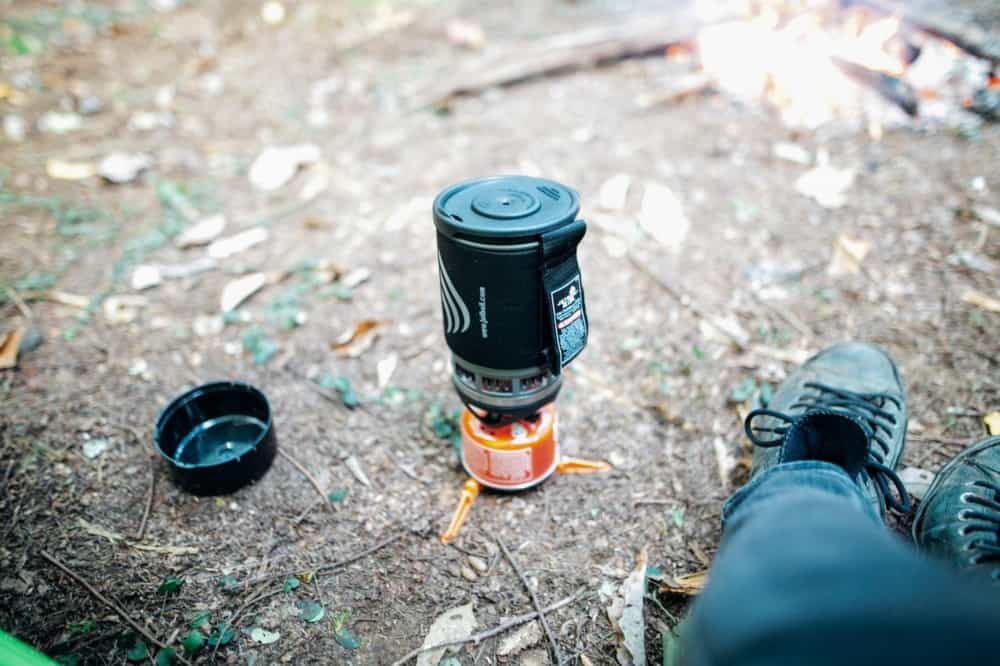
FAQs
Can I use MSR fuel in a Jetboil stove?
MSR IsoPro fuel is compatible with Jetboil stoves and is a suitable alternative for Jetpower fuel. MSR IsoPro and Jetboil Jetpower are high-performance fuels with the same gas blend and valve type.
Can I use Coleman fuel with a Jetboil stove?
Coleman Performance and Xtreme fuel canisters are compatible with Jetboil stoves. However, Coleman uses the cheaper, lower-performance butane fuel rather than the isobutane found in Jetboil Jetpower and MSR IsoPro fuel canisters.
Coleman has increased the proportion of propane in the blend to 30% and claims that the fuel works even at -27°C. But I would be very nervous about relying on a canister stove at low temperatures.
If you want Jetpower-like performance, look towards the MSR IsoPro instead.
Can you fly with Jetboil fuel?
You cannot fly with Jetboil fuel or any other camping stove fuel. Camping gas is banned by the Transportation Security Administration in both carry-on baggage and checked baggage. Fuel should be purchased when you reach your destination.
How should I store Jetboil fuel canisters?
Jetboil fuel canisters should be disconnected from the stove and stored in a dry, cool place. Fuel canisters should not be left in heat over 50°C. Be wary of leaving the canisters in potentially hot locations such as sheds or the back of a car.
Can I use Jetboil Jetpower fuel in cold weather?
Jetboil Jetpower fuel can be used in cold weather thanks to its propane blend. However, it is not suitable for extreme cold, such as mountaineering. Liquid fuel stoves are much more reliable than canister stoves in freezing climates.
Are Jetboil fuel canisters refillable?
Jetboil fuel canisters should not be refilled. It is not safe for non-experts to work with gas and pressurised containers.
Does Jetboil fuel contain propane or butane?
Jetboil uses a blend of propane and isobutane fuel. This blend balances high heat output and efficient fuel consumption, making it an excellent outdoor cooking and heating choice.
Wrapping up on Jetboil fuel
In conclusion, Jetboil uses Jetpower fuel canisters, which consist of an 80% Iso-Butane, 20% Propane mixture. This blend allows the stove to perform well in all seasons and temperatures as low as -44°F. While other fuel brands or canisters may be usable, Jetboil recommends using their own Jetpower canisters for optimal performance and efficiency.
Happy Camping 😊
